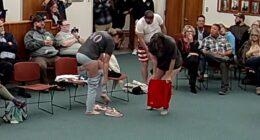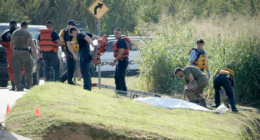Share this @internewscast.com
Who was Desmond Tutu?
Desmond Tutu (7 October 1931 – 26 December 2021) was a South African Anglican bishop and theologian, known for his work as an anti-apartheid and human rights activist.
He was the Bishop of Johannesburg from 1985 to 1986 and then the Archbishop of Cape Town from 1986 to 1996, in both cases being the first black African to hold the position. Theologically, he sought to fuse ideas from black theology with African theology.
South African anti-apartheid icon Desmond Tutu dies at 90

Archbishop Desmond Tutu, South African anti-apartheid activist, and Nobel Peace Prize Laureate, died on Sunday. He was 90.
Tutu was diagnosed with prostate cancer in 1997, following which he was hospitalized several times for treatment, Reuters reported.
He died in Cape Town’s Oasis Frail Care Centre, said Ramphela Mamphele, acting chairperson of the Archbishop Desmond Tutu IP Trust.
South African President Cyril Ramaphosa said on Twitter that the anti-apartheid icon’s death is “another chapter of bereavement” in the country’s “farewell to a generation of outstanding South Africans” that have liberated the country.
“Desmond Tutu was a patriot without equal; a leader of principle and pragmatism who gave meaning to the biblical insight that faith without works is dead,” the president added.
Tutu won the Nobel Peace Prize in 1984 for his non-violent resistance to the apartheid regime. He later chaired a Truth and Reconciliation Commission that was established in 1996 to record the atrocities committed during the apartheid and offer rehabilitation to the victims.
Desmond Tutu Biography, Wiki
Tutu was born of Xhosa and Tswana parents and was educated in South African mission schools at which his father taught. Though he wanted a medical career, Tutu was unable to afford training and instead became a schoolteacher in 1955. He resigned his post in 1957.
He then attended St. Peter’s Theological College in Johannesburg and was ordained an Anglican priest in 1961. In 1962 he moved to London, wherein 1966 he obtained an M.A. from King’s College London.
From 1972 to 1975 he served as an associate director for the World Council of Churches. He was appointed dean of St. Mary’s Cathedral in Johannesburg in 1975, the first Black South African to hold that position. From 1976 to 1978 Tutu served as bishop of Lesotho.
In 1978 Tutu accepted an appointment as the general secretary of the South African Council of Churches and became a leading spokesperson for the rights of Black South Africans. During the 1980s he played an unrivaled role in drawing national and international attention to the iniquities of apartheid.
He emphasized nonviolent means of protest and encouraged the application of economic pressure by countries dealing with South Africa. The award of the 1984 Nobel Prize for Peace to Tutu sent a significant message to South African Pres. P.W. Botha’s administration.
In 1985, at the height of the township rebellions in South Africa, Tutu was installed as Johannesburg’s first Black Anglican bishop, and in 1986 he was elected the first Black Archbishop of Cape Town, thus becoming the primate of South Africa’s 1.6 million-member Anglican church.
In 1988 Tutu took a position as chancellor of the University of the Western Cape in Bellville, South Africa.

| Birth name | Desmond Mpilo Tutu |
|---|---|
| Born | 7 October 1931 Klerksdorp, South Africa |
| Died | 26 December 2021 (aged 90) Cape Town, South Africa |
| Spouse | Nomalizo Leah Shenxane(m. 1955) |
| Children | 4, including Mpho |
| Occupation | Bishop, theologian, social activist, author |
| Education | King’s College, University of London |
Desmond Tutu Career
He returned to his alma mater, Johannesburg Bantu High School, as a teacher. He also taught for sometime at Munsienville High School in Mogale City. The government passed the Bantu Education Act in 1953.
The law lowered the standards of education for black South Africans and greatly limited their chances of receiving good quality higher education.For a few years he tried his best to provide good education to his students in spite of the legal limitations, but grew increasingly frustrated at this Act which explicitly promoted inequality.
Unwilling to be a part of the corrupt education system anymore, he resigned from his teaching job in 1957.He then continued his education, this time studying theology at St Peter’s Theological College in Rosettenville, Johannesburg. He was ordained as an Anglican deacon in 1960 and as a priest in 1961.
He went to England in 1962 to pursue further theological studies at the King’s College London and received his master’s degree in theology in 1966. He returned to South Africa in 1967.He began teaching at the Federal Theological Seminary at Alice in the Eastern Cape and also became the chaplain at the University of Fort Hare in 1967.
He lectured at the National University of Lesotho from 1970 to 1972.He returned to England in 1972 where he was appointed vice-director of the Theological Education Fund of the World Council of Churches, at Bromley in Kent.
After serving there for three years he came back to South Africa.In 1975, he was appointed Dean of St. Mary’s Cathedral in Johannesburg, the first black person to hold that position.
Desmond Tutu Personal Life
Desmond Tutu married Nomalizo Leah Shenxane, a teacher, in 1955. They had four children.

He was diagnosed with prostate cancer in 1997 and underwent successful treatment in the U.S.
Desmond Tutu died in Cape Town, South Africa, on December 26, 2021. He was 90 years old.
Desmond Tutu Awards
- Desmond Tutu was awarded the 1984 Nobel Peace Prize for his “role as a unifying leader figure in the campaign to resolve the problem of apartheid in South Africa”.
- In 1992, he was awarded the Bishop John T. Walker Distinguished Humanitarian Service Award.
- He became the first recipient of the newly created Archbishop of Canterbury’s Award for Outstanding Service to the Anglican Communion in 1996.
- He received the Wallenberg Medal from the University of Michigan in recognition of his lifelong work in defense of human rights and dignity in 2008. The same year, he was also awarded the J. William Fulbright Prize for International Understanding.
Desmond Tutu FAQ’s
Who was Desmond Tutu?
Desmond Tutu (7 October 1931 – 26 December 2021) was a South African Anglican bishop and theologian, known for his work as an anti-apartheid and human rights activist.
How did Desmond Tutu?
Tutu was diagnosed with prostate cancer in 1997, following which he was hospitalized several times for treatment, Reuters reported.
Who is Desmond Tutu’s wife?
Desmond Tutu married Nomalizo Leah Shenxane, a teacher, in 1955. They had four children.
Also Read:
- Dinah Jane Hansen Biography, Wiki, Age, Career, Boyfriend, Net Worth & More
- Melanie C Biography, Wiki, Age, Career, Boyfriend, NetWorth | Who is Singer Melanie C? Bio, Wiki
Related
Source: This post first appeared on https://fitnessfreak360.com





